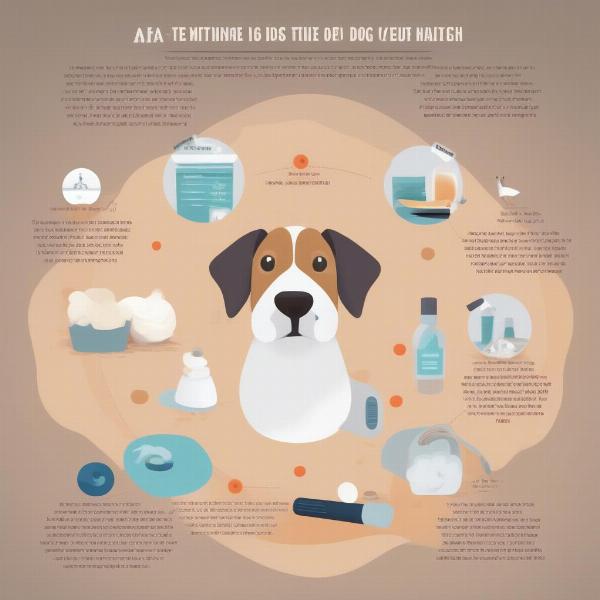Prinocate is not a medication specifically designed or approved for use in dogs. Searching for “prinocate for dogs” suggests you may be looking for information on eye medications or treatments for your dog, possibly confusing it with a similar-sounding medication. It’s crucial to understand that giving your dog any medication not specifically prescribed by a veterinarian can be dangerous and potentially harmful. This article will address common eye issues in dogs and highlight the importance of consulting a veterinarian for proper diagnosis and treatment.
Understanding the risks associated with using unprescribed medications for your dog is paramount. Human medications, even those seemingly harmless, can have vastly different effects on dogs and can lead to serious health complications or even death. Never administer any medication to your dog without first consulting your veterinarian. They can properly diagnose the issue and prescribe the correct medication and dosage, ensuring your dog’s safety and well-being.
Common Eye Problems in Dogs
Dogs can experience various eye problems, ranging from minor irritations to serious conditions. Some common eye issues include:
- Conjunctivitis: This is an inflammation of the conjunctiva, the membrane that lines the eyelids and covers the white part of the eye. Symptoms include redness, swelling, discharge, and squinting.
- Cataracts: Clouding of the lens of the eye, leading to blurred vision. Cataracts can develop due to aging, genetics, trauma, or other underlying health conditions.
- Glaucoma: Increased pressure within the eye, which can damage the optic nerve and lead to blindness. Symptoms can include redness, cloudiness, dilated pupils, and pain.
- Dry Eye (Keratoconjunctivitis Sicca – KCS): Insufficient tear production, leading to dry, irritated eyes. Symptoms include redness, mucus discharge, and squinting.
- Corneal Ulcers: These are open sores on the cornea, the clear front surface of the eye. They can be caused by injuries, infections, or dry eye.
Why Seeing a Vet is Crucial for Dog Eye Issues
Accurate diagnosis is essential for effective treatment of eye problems in dogs. A veterinarian can perform a thorough examination of your dog’s eyes, including checking for corneal ulcers, evaluating tear production, and measuring intraocular pressure. They can also identify underlying health conditions that may be contributing to the eye problem. Based on the diagnosis, the vet will prescribe the appropriate medication and dosage, tailored to your dog’s specific needs and condition.
What to Expect at the Vet Visit
During the examination, the veterinarian will likely ask about your dog’s medical history, symptoms, and any recent changes in their behavior. Be prepared to answer questions about when you first noticed the eye issue, any discharge you’ve observed, and whether your dog seems to be in pain. The vet may use specialized instruments like an ophthalmoscope to examine the internal structures of the eye. They might also perform tests like a fluorescein stain to detect corneal ulcers or a Schirmer tear test to evaluate tear production.
Safeguarding Your Dog’s Eye Health
Prevention is always better than cure. Regularly cleaning your dog’s eyes with a pet-safe eye wash can help prevent infections. Be mindful of potential hazards in your environment that could injure your dog’s eyes, such as sharp objects or irritating chemicals. Protecting your dog’s eyes also includes regular checkups. Early detection and treatment of eye problems can prevent further complications and preserve your dog’s vision.
 Dog Eye Care Tips
Dog Eye Care Tips
Conclusion
When it comes to your dog’s eye health, always seek professional veterinary advice. Using unprescribed medications like “prinocate for dogs” can be dangerous. A veterinarian can accurately diagnose the problem and prescribe the appropriate treatment. Remember, prompt and proper care is vital for preserving your furry friend’s vision and overall well-being.
FAQ
- What should I do if I notice my dog’s eye is red and watery? Contact your veterinarian immediately for an appointment.
- Can I use human eye drops on my dog? No, never use human medications on your dog without consulting a vet.
- Are all dog eye problems serious? No, some are minor irritations, but others can be serious and require immediate veterinary attention.
- How can I prevent eye infections in my dog? Regular eye cleaning and avoiding potential hazards can help.
- How often should I take my dog for eye checkups? Discuss this with your vet; they can recommend an appropriate schedule based on your dog’s age, breed, and health history.
- What are the signs of glaucoma in dogs? Redness, cloudiness, dilated pupils, and pain are some potential signs.
- Can cataracts be treated in dogs? Yes, surgery is often an effective treatment for cataracts in dogs.
ILM Dog is a leading international online resource for dog care and well-being. We provide expert advice on everything from breed selection and puppy care to senior dog health and training. Whether you’re a new dog owner or a seasoned expert, ILM Dog offers a wealth of information to help you provide the best possible care for your furry companion. Explore our website for more articles on dog health, nutrition, behavior, and much more. Contact us at [email protected] or +44 20-3965-8624 for personalized guidance. Visit ILM Dog today!